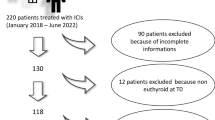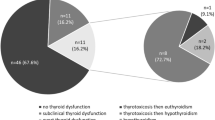Abstract
Purpose
Autoimmune diseases are typically associated with immune checkpoints blockade. This study aims at assessing, in real-life clinical practice, the prevalence and impact of thyroid disorders induced by immune checkpoint inhibitors.
Methods
52 patients (30 F; age 61 ± 13 years) with advanced melanoma treated with ipilimumab (3 mg/kg i.v./3 weeks; 4 doses) were included. For disease progression, 29 (16 F) of them received nivolumab (3 mg/kg i.v./2 weeks) or pembrolizumab (2 mg/kg i.v./3 weeks). Thyroid function and autoimmunity were assessed before, after 6 weeks, at the end of ipilimumab, as well as before and every 3 months during nivolumab/pembrolizumab treatment.
Results
During ipilimumab, 7 (4 F) patients developed thyroid dysfunction (4 thyroiditis, 1 associated with hypothyroidism; 2 thyrotoxicosis in a previously euthyroid multinodular goiter; 1 hypothyroidism worsened). During PD1 inhibitors, 7 patients (3 F) developed hypothyroidism with severe manifestations in 6 of them; 3 patients suffered from euthyroid autoimmune thyroiditis from baseline, one after ipilimumab; 2 patients developed after transient thyrotoxicosis. Mean follow-up after anti-CTLA4 inhibitors treatment was 36 ± 28 months. Thyroid disorders occurred 45.1 ± 20.8 and 151 ± 67 days after the initiation of CTLA4 and PD1 inhibitors, respectively. Autoimmune disorders and BRAF mutation were associated with a better clinical response to CTLA4 followed by PD1 treatment.
Conclusions
Immune checkpoint blockade is burdened by a high incidence of autoimmune thyroid dysfunction, which is often severe. Therefore, early and careful monitoring and, eventually, treatment are crucial to prevent the negative impact of thyroid dysfunction on the clinical outcome.
Similar content being viewed by others
References
Postow MA, Callahan MK, Wolchok JD (2015) Immune checkpoint blockade in cancer therapy. J Clin Oncol 33:1974–1982. doi:10.1200/JCO.2014.59.4358
Pardoll DM (2012) The blockade of immune checkpoints in cancer immunotherapy. Nat Rev Cancer 12:252–264. doi:10.1038/nrc3239
Rossi E, Sgambato A, De Chiara G, Ciardiello F, Gridelli C (2016) Thyroid-induced toxicity of check-point inhibitors immunotherapy in the treatment of advanced non-small cell lung cancer. J Endocrinol Diabetes 3:1–10
Abdel-Wahab N, Shah M, Suarez-Almazor ME (2016) Adverse events associated with immune checkpoint blockade in patients with cancer: a systematic review of case reports. PLoS One 11:e0160221. doi:10.1371/journal.pone.0160221
Hazarika M, Chuk MK, Theoret MR, Mushti S, He K, Weis SL, Putman AH, Helms WS, Cao X, Li H, Zhao L, Welch J, Graham L, Libeg M, Sridhara R, Keegan P, Pazdur R (2017) US FDA approval summary: nivolumab for treatment of unresectable or metastatic melanoma following progression on ipilimumab. Clin Cancer Res. doi:10.1158/1078-0432.CCR-16-0712 (epub ahead of print)
Beaver JA, Theoret MR, Mushti S, He K, Libeg M, Goldberg K, Sridhara R, McKee AE, Keegan P, Pazdur R (2017) FDA approval of nivolumab for the first-line treatment of patients with BRAFV600 wild-type unresectable or metastatic melanoma. Clin Cancer Res. doi:10.1158/1078-0432 (epub ahead of print)
Weber JS, Yang JC, Atkins MB, Disis ML (2015) Toxicities of immunotherapy for the practitioner. J Clin Oncol 33:2092–2099. doi:10.1200/JCO.2014.60.0379
Abdel-Rahman O, El Halawani H, Fouad M (2016) Risk of endocrine complications in cancer patients treated with immune check point inhibitors: a meta-analysis. Future Oncol 12:413–425. doi:10.2217/fon.15.222
Torino F, Corsello SM, Salvatori R (2016) Endocrinological side-effects of immune checkpoint inhibitors. Curr Opin Oncol 28:278–287. doi:10.1097/CCO.0000000000000293
Edge S, Byrd DR, Compton CC, Fritz AG, Greene FL, Trotti A, American Joint Committee on Cancer (2010) AJCC cancer staging manual, 7th edn. Springer, Heidelberg
Seymour L, Bogaerts J, Perrone A, Ford R, Schwartz LH, Mandrekar S, Lin NU, Litière S, Dancey J, Chen A, Hodi FS, Therasse P, Hoekstra OS, Shankar LK, Wolchok JD, Ballinger M, Caramella C, de Vries EG, RECIST working group (2017) iRECIST: guidelines for response criteria for use in trials testing immunotherapeutics. Lancet Oncol 18:e143–e152. doi:10.1016/S1470-2045(17)30074-8
Costa R, Carneiro BA, Agulnik M, Rademaker AW, Pai SG, Villaflor VM, Cristofanilli M, Sosman JA, Giles FJ (2017) Toxicity profile of approved anti-PD1 monoclonal antibodies in solid tumors: a systematic review and meta-analysis of randomized clinical trials. Oncotarget 8:8910–8920. doi:10.18632/oncotarget.13315
de Filette J, Jansen Y, Schreuer M, Everaert H, Velkeniers B, Neyns B, Bravenboer B (2016) Incidence of thyroid-related adverse events in melanoma patients treated with pembrolizumab. J Clin Endocrinol Metab 101:4431–4439
Delivanis DA, Gustafson MP, Bornschlegl S, Merten MM, Kottschade L, Withers S, Dietz AB, Ryderl M (2017) Pembrolizumab-induced thyroiditis: comprehensive clinical review and insights into underlying involved mechanisms. J Clin Endocrinol Metab 102:2770–2780
Garber JR, Cobin RH, Gharib H, Hennessey JV, Klein I, Mechanick JI, Pessah-Pollack R, Singer PA, Woeber KA, American Association of Clinical Endocrinologists and American Thyroid Association Taskforce on Hypothyroidism in Adults (2012) Clinical practice guidelines for hypothyroidism in adults: cosponsored by the American Association of Clinical Endocrinologists and the American Thyroid Association. Endocr Pract 18:988–1028
Ross DS, Burch HB, Cooper DS, Greenlee MC, Laurberg P, Maia AL, Rivkees SA, Samuels M, Sosa JA, Stan MN, Walter MA (2016) 2016 American Thyroid Association Guidelines for diagnosis and management of hyperthyroidism and other causes of thyrotoxicosis. Thyroid 26:1343–1421
Bartalena L, Chiovato L, Vitti P (2016) Management of hyperthyroidism due to Graves’ disease: frequently asked questions and answers (if any). J Endocrinol Invest 39:1105–1114. doi:10.1007/s40618-016-0505-x
Alhusseini M, Samantray J (2017) Hypothyroidism in cancer patients on immune checkpoint inhibitors with anti-PD1 agents: insights on underlying mechanisms. Exp Clin Endocrinol Diabetes 125:267–269. doi:10.1055/s-0042-119528
Gessl A, Lemmens-Gruber R, Kautzky-Willer A (2012) Thyroid disorders. Handb Exp Pharmacol 214:361–386. doi:10.1007/978-3-642-30726-3_17
Byun DJ, Wolchok JD, Rosenberg LM, Girotra M (2017) Cancer immunotherapy—immune checkpoint blockade and associated endocrinopathies. Nat Rev Endocrinol 13:195–207. doi:10.1038/nrendo.2016.205
Gogas H, Ioannovich J, Dafni U, Stavropoulou-Giokas C, Frangia K, Tsoutsos D, Panagiotou P, Polyzos A, Papadopoulos O, Stratigos A, Markopoulos C, Bafaloukos D, Pectasides D, Fountzilas G, Kirkwood JM (2006) Prognostic significance of autoimmunity during treatment of melanoma with interferon. N Engl J Med 354:709–718
Attia P, Phan GQ, Maker AV, Robinson MR, Quezado MM, Yang JC, Sherry RM, Topalian SL, Kammula US, Royal RE, Restifo NP, Haworth LR, Levy C, Mayroukakis SA, Nichol G, Yellin MJ, Rosenberg SA (2005) Autoimmunity correlates with tumor regression in patients with metastatic melanoma treated with anti-cytotoxic T-lymphocyte antigen-4. J Clin Oncol 23:6043–6053
Author information
Authors and Affiliations
Corresponding author
Ethics declarations
Conflict of interest
The authors declare they have no conflict of interest.
Ethical approval
All procedures performed in studies involving human participants were in accordance with the ethical standards of the institutional and/or national research committee and with the 1964 Helsinki declaration and its later amendments or comparable ethical standards.
Informed consent
Informed consent was obtained from all individual participants included in the study that was approved by the Hospital Ethics Committee.
Rights and permissions
About this article
Cite this article
Guaraldi, F., La Selva, R., Samà, M.T. et al. Characterization and implications of thyroid dysfunction induced by immune checkpoint inhibitors in real-life clinical practice: a long-term prospective study from a referral institution. J Endocrinol Invest 41, 549–556 (2018). https://doi.org/10.1007/s40618-017-0772-1
Received:
Accepted:
Published:
Issue Date:
DOI: https://doi.org/10.1007/s40618-017-0772-1




